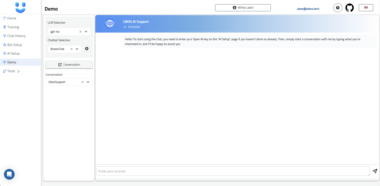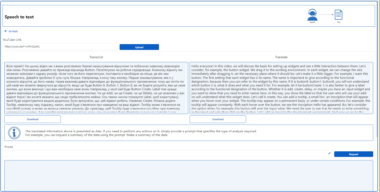Unleashing the Power of MCP Server: Revolutionizing Data Management with Seamless Integration
In today’s fast-paced digital era, the demand for efficient data management solutions is at an all-time high. The MCP Server, a cutting-edge innovation, seamlessly integrates databases with the convenience of VS Code, offering a unified platform for developers and businesses alike. In this comprehensive overview, we delve into the myriad of applications and key features that make MCP Server a game-changer in the realm of data management.
What is MCP Server?
MCP Server, short for Model Context Protocol Server, serves as an open protocol that standardizes the interaction between applications and Large Language Models (LLMs). Acting as a bridge, it facilitates seamless access and interaction with external data sources and tools, thereby enhancing the capabilities of AI models. This integration empowers businesses to harness the full potential of their data, driving informed decision-making and fostering innovation.
Key Features of MCP Server
1. Database Integration
MCP Server supports a wide range of major databases, ensuring compatibility and ease of use. This feature enables businesses to connect their existing data infrastructure with the platform, facilitating seamless data access and management.
2. Visual Data Management
With MCP Server, users can view and edit data effortlessly. The platform offers functionalities such as filtering, sorting, and grouping data with just a few clicks. Additionally, users can perform Create, Read, Update, and Delete (CRUD) operations without the need for complex SQL queries, minimizing errors and enhancing productivity.
3. Copilot Integration
The Copilot integration is a standout feature of MCP Server, allowing users to query data with ease. By asking schema-specific questions, generating queries, and creating new tables, users can interact with their data in a more intuitive and efficient manner.
4. Entity Relationship Diagrams
Automatically generate entity relationship diagrams to visually map out database structures. This feature simplifies the understanding of complex data relationships, aiding in the design and optimization of database schemas.
5. Effortless Data Exploration
MCP Server enables users to explore data effortlessly by opening foreign key relationships within their datasets. This capability allows for a deeper understanding of data connections, without the need for extensive querying.
6. Custom SQL Execution
For advanced users, MCP Server offers the ability to run custom SQL queries directly within VS Code. This feature provides flexibility and control over data manipulation, catering to the needs of seasoned developers.
7. Secure Report Sharing
Security is paramount in data management, and MCP Server addresses this with its secure report sharing feature. Reports are encrypted and linked, ensuring that sensitive information is protected during transmission.
8. Visual Data Representation
Graphically represent data with a variety of chart types, including line, bar, and pie charts. MCP Server allows for chart customization, providing users with the tools to create compelling visualizations that convey insights effectively.
Use Cases of MCP Server
Enhancing Business Intelligence
Businesses can leverage MCP Server to enhance their business intelligence capabilities. By integrating databases with VS Code, organizations can streamline data analysis, generate insights, and make data-driven decisions with ease.
Facilitating AI Development
For developers working on AI projects, MCP Server provides a robust platform for integrating AI models with external data sources. This integration enables the development of sophisticated AI applications that can access and process vast amounts of data efficiently.
Streamlining Data Management
MCP Server simplifies data management processes, making it an ideal solution for organizations seeking to optimize their data workflows. The platform’s intuitive interface and powerful features enable users to manage data with minimal effort and maximum efficiency.
UBOS Platform: Empowering AI Agent Development
The UBOS platform complements MCP Server by offering a full-stack AI agent development environment. Focused on bringing AI agents to every business department, UBOS helps orchestrate AI agents, connect them with enterprise data, and build custom AI agents with LLM models and multi-agent systems. Together, MCP Server and UBOS provide a comprehensive solution for businesses looking to harness the power of AI and data.
In conclusion, MCP Server stands as a transformative tool in the realm of data management and AI integration. Its seamless integration with databases and VS Code, coupled with its robust features, positions it as an indispensable asset for businesses and developers alike. By adopting MCP Server, organizations can unlock new levels of efficiency, innovation, and insight, driving their success in the digital age.
DBCode – Database Management
Project Details
- dbcodeio/public
- dbcode
- Last Updated: 4/20/2025
Recomended MCP Servers
Model Context Protocol (MCP) implementation for Opik enabling seamless IDE integration and unified access to prompts, projects, traces,...
MCP Server that integrates with Security Copilot, Sentinel and other tools (in the future). It enhance the process...
An MCP service designed for deploying HTML content to EdgeOne Pages and obtaining an accessible public URL.
An MCP (Model Context Protocol) server implementation that integrates Claude with Salesforce, enabling natural language interactions with your...
A Model Context Protocol (MCP) server that enables AI assistants to perform web searches using SearXNG, a privacy-respecting...




Stata MCP Extension for VS Code and Cursor IDE

Implementation of an MCP (Model Context Protocol) Server for SQLite. It provides an AI model with context and...
 From vibe coding to vibe deployment. UBOS MCP turns ideas into infra with one message.
From vibe coding to vibe deployment. UBOS MCP turns ideas into infra with one message.






